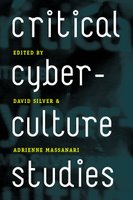critical cyberculture studies
i've just received word that an anthology that adrienne massanari and i edited, titled critical cyberculture studies, will be available soonish from nyu press. it is exciting to see the book come to life (almost!) and it has been a terrific experience working closely with emily park and her team at nyu press.
 i was psyched to learn that howard rheingold, one of my favorites in the field, supplied a soundbite for the back cover: "As studies of the Internet and cyberculture begin to mature, it is a particularly important time for critical studies - critical of the subject matter, and critical of the emerging field itself. The consciously interdisciplinary approach of Critical Cyberculture Studies, and the depth and breadth of the contributions, make this an important foundational work at the beginnings of a new field of studies. If only we had a critical study of communication when the Gutenberg revolution was beginning!" - Howard Rheingold, author of The Virtual Community and Smart Mobs
i was psyched to learn that howard rheingold, one of my favorites in the field, supplied a soundbite for the back cover: "As studies of the Internet and cyberculture begin to mature, it is a particularly important time for critical studies - critical of the subject matter, and critical of the emerging field itself. The consciously interdisciplinary approach of Critical Cyberculture Studies, and the depth and breadth of the contributions, make this an important foundational work at the beginnings of a new field of studies. If only we had a critical study of communication when the Gutenberg revolution was beginning!" - Howard Rheingold, author of The Virtual Community and Smart Mobshere's the table of contents:
- Foreword: Dreams of Fields: Possible Trajectories of Internet Studies, by Steve Jones
- The Historiography of Cyberculture, by Jonathan Sterne
- Cultural Difference, Theory, and Cyberculture Studies: A Case of Mutual Repulsion, by Lisa Nakamura
- How We Became Postdigital: From CyberStudies to Game Studies, by Espen Aarseth
- Internet Studies in Times of Terror, by David Silver and Alice Marwick
- Catching the Waves: Considering Cyberculture, Technoculture, and Electronic Consumption, by Wendy Robinson
- Cyberculture Studies: An Antidisciplinary Approach (version 3.0), by McKenzie Wark
PART II Critical Approaches and Methods - Finding the Quality in Qualitative Research, Nancy K. Baym
- Web Sphere Analysis and Cybercultural Studies, Kirsten Foot
- Connecting the Selves: Computer-Mediated Identification Processes, by Heidi J. Figueroa Sarriera
- The Structural Problems of the Internet for Cultural Policy, by Christian Sandvig
- Cultural Considerations in Internet Policy and Design: A Case Study from Central Asia, by Beth E. Kolko
- Bridging Cyberlife and Real Life: A Study of Online Communities in Hong Kong, by Anthony Fung
- Overcoming Institutional Marginalization, by Blanca Gordo
- The Vertical (Layered) Net: Interrogating the Conditions of Network Connectivity, by Greg Elmer
- The Construction of Cybersocial Reality, by Stine Gotved
PART III Cultural Difference in/and Cyberculture - E-scaping Boundaries: Bridging Cyberspace and Diaspora Studies through Nethnography, by Emily Noelle Ignacio
- An Interdisciplinary Approach to the Study of Cybercultures, by Madhavi Mallapragada
- An Action Research (AR) Manifesto for Cyberculture Power to "Marginalized" Cultures of Difference, by Bharat Mehra
- Cyberstudies and the Politics of Visibility, by David J. Phillips
- Disaggregation, Technology, and Masculinity: Elements of Internet Research, by Frank Schaap
- Gender, Technology, and Visual Cyberculture: Virtually Women, by Kate O'Riordan
PART IV Critical Histories of the Recent Past - How Digital Technology Found Utopian Ideology: Lessons from the First Hackers' Conference, by Fred Turner
- Government.com: ICTs and Reforming Governance in Asia, by Shanthi Kalathil
- Dot-Coms and Cyberculture Studies: Amazon.com as a Case Study, by Adrienne Massanari
- Associating Independents: Business Relationships and the Culture of Independence in the Dot-Com Era, by Gina Neff
About the Contributors
Introduction: Where Is Internet Studies? by David Silver
PART I Fielding the Field

4 Comments:
Sounds like a fabulous collection which may very well find pride of place on a number of Intro to Cyber/Culture type courses in the coming year! :)
The big question, of course, is who will review it for RCSS ...
thanks tama! it's a really interesting collection that approaches the field from many different perspectives. as for rccs review ... ooh, yikes, good question! is it ethical to have one's own book reviewed by one's own center? i don't think so.
great job. I think that instead of having it reviewed by your center, you should invite a roundtable review, with at least 4 scholars, where each one reviews and responds to the other reviews. i think it is perfectly fine to do that, as long as you take a hands off approach.
tmnsg936aa
golden goose outlet
golden goose outlet
golden goose outlet
golden goose outlet
golden goose outlet
golden goose outlet
golden goose outlet
golden goose outlet
golden goose outlet
golden goose outlet
Post a Comment
<< Home